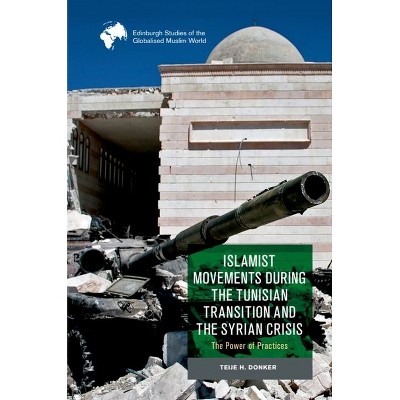Sponsored

The Making of the Tunisian Revolution - by Nouri Gana (Paperback)
In Stock
Sponsored
About this item
Highlights
- From late 2010 to the present day, the Arab world has been shot through with insurrection and revolt.
- About the Author: Nouri Gana is Associate Professor of Comparative Literature & Near Eastern Languages and Cultures at UCLA.
- 352 Pages
- History, Middle East
Description
About the Book
Mixing political, historical, economic, social and cultural analyses and approaches, these essays reflect on the local, regional and transnational dynamics together with the long and short term factors that, when combined, set in motion the Tunisian revolution and the Arab uprisings.Book Synopsis
From late 2010 to the present day, the Arab world has been shot through with insurrection and revolt. As a result, Tunisia is now seen as the unlikely birth place and exemplar of the process of democratisation long overdue in the Arab world. Mixing political, historical, economic, social and cultural analyses and approaches, these essays reflect on the local, regional and transnational dynamics together with the long and short term factors that, when combined, set in motion the Tunisian revolution and the Arab uprisings. Above all, the book maps the intertwined genealogies of cultural dissent that have contributed to the mobilisation of protesters and to the sustenance of protests between 17 December 2010 and 14 January 2011, and beyond.
From the Back Cover
"This is a readable, strong book whose authors individually and collectively narrate and contextualize Tunisia's revolution masterfully. Nouri Gana and his co-authors must be applauded. No other text on the Arab World's first revolution matches this book in terms of substance, evidence, intelligence and clarity of purpose and direction. It is a definite must." Larbi Sadiki, specialist on Arab democratization, University of Exeter, Qatar University, Al-Jazeera English Columnist "The Making of the Tunisian Revolution offers an early and impressive appraisal of the roots and results of a revolution that came to alter the political landscape of the Arab world for good." Asef Bayat, the Catherine and Bruce Bastian Professor of Global and Transnational Studies, University of Illinois A unique, timely, and wide-ranging account of the making of the Tunisian revolution and the ensuing transition to democracy Since late 2010, the history of the Arab world has been shot through with insurrection and revolt. Tunisia has become the unlikely birthplace and exemplar of the process of democratization long overdue in the Arab world. Mixing political, historical, economic, social, and cultural analyses and approaches, this volume advances a cohesive and sustained set of reflections on the local, regional, and transnational dynamics as well as the long-term and short-term factors that have combined to set in motion the Tunisian revolution and the Arab uprisings writ large. Above all, The Making of the Tunisian Revolution maps the intertwined genealogies of cultural and social dissent that have contributed to the mobilization of protesters and to the continuation of protests between December 17, 2010 and January 14, 2011 and beyond. The book ends with insightful assessments of the challenges to and the prospects for democratization in postrevolutionary Tunisia. Nouri Gana is an Associate Professor of Comparative Literature & Near Eastern Languages and Cultures at UCLA. He is the author of Signifying Loss: Toward a Poetics of Narrative Mourning (2011) and editor of The Edinburgh Companion to the Arab Novel in English (Edinburgh University Press, 2013). Front cover image: (c) Fethi Belaid/AFP/Getty Images. Back cover image: (c) Yuriy Kirsanov/iStockphoto.com. Cover design: [EUP logo] www.euppublishing.comReview Quotes
The Making of the Tunisian Revolution is what an edited volume about Tunisia should be: holistic, polemic, and strategically incendiary. Each chapter is placed to bring into question much of what the media has presented as truth. Herein lays the opportunity to be guided by experts who lead us through the Tunisian revolution into the post-revolution present. Reading this volume compels us to reconsider the standard Tunisia we are often provided: a progressive oasis in "the region," a liberal and neoliberal economic success story for international lending institutions and their cronies to hold up as proof that (so-called) free market capitalism works.--Claire Oueslati-Porter, Florida International University "Middle East Media and Book Reviews"
Such a relatively short historical period has been treated with a rare depth and a meticulous selection of the issues and dynamics that combine to make Tunisia a case study so interesting to those who analyse the Arab world today.'-- "British Journal of Middle Eastern Studies, Vol. 41, No. 4"
The seismic event surrounding Tunisia's Arab Spring has reverberated throughout the world creating in its wake a multitude of observational accounts seeking to explain the Tunisian phenomenon. Yet few have been able to provide the kind of contextual richness and analytical sharpness as the authors of this edited volume. Conceptualized within a historically defined pathway, The Making of the Tunisian Revolution creatively intersects contexts, architects, and prospects to provide a compelling narrative within which to understand the multilayered character of the Tunisian revolutionary experience. Meticulously researched by authors with direct experience in the country, this multi-disciplinary and highly readable book should find a wide audience within academic and policy circles as it constitutes the most authoritative, fair-minded, and deeply informed account of the Tunisian revolution yet published.--Professor of Political Science at Fordham University "John P. Entelis"
The Making of the Tunisian Revolution offers an early and impressive appraisal of the roots and results of a revolution that came to alter the political landscape of the Arab world for good.--Catherine and Bruce Bastian Professor of Global and Transnational Studies, University of Illinois "Asef Bayat"
This is a readable, strong book whose authors individually and collectively narrate and contextualise Tunisia's revolution masterfully. No other text on the Arab World's first revolution matches this book in terms of substance, evidence, intelligence and clarity of purpose and direction. Nouri Gana and his co-authors must be applauded for finally giving readers a book the chief distinction of which is rich food for thought for all types of readers - the specialist and the lay. This is a work that reveals under-studied dimensions and new angles, presenting the revolutionary foundation in greater depth and detail than any book I have read so far in English and French on the Tunisian political tsunami of 2011. It is a definite must.--specialist on Arab democratisation, University of Exeter, Qatar University, Al Jazeera English columnist "Larbi Sadiki"
About the Author
Nouri Gana is Associate Professor of Comparative Literature & Near Eastern Languages and Cultures at UCLA. He is the author of Signifying Loss: Toward a Poetics of Narrative Mourning (2011) and editor of The Making of the Tunisian Revolution: Contexts, Architects, Prospects (EUP, 2013) and The Edinburgh Companion to the Arab Novel in English (Edinburgh University Press, 2013).
Shipping details
Return details
Frequently bought together


Trending Non-Fiction















